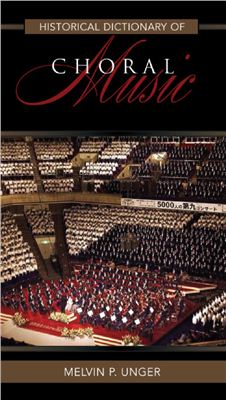Scarecrow Press, 2010. - 584 pages.
This book is an incredible accomplishment, successfully covering both familiar and lesser known individuals and repertoire, as well as the standard choral genres. It will prove useful for professionals and lay musicians alike, and will be particularly welcome in university graduate programs, which have long needed a resource of this type. (Donald Neuen )
The importance of Melvin Unger's new book, Historical Dictionary of Choral Music, is immeasurable. The breadth of the scope of material is what one would expect, but the succinct details of definitions, personalities, styles, and political and artistic attitudes elevate the book to the level of masterwork. (Robert Page )
Unger (Handbook to Bach’s Sacred Cantata Texts) opens this singular reference with a chronology locates the genesis of choral music in 590 CE. The 1000 fully cross-referenced, alphabetized entries define both religious and secular choral composers, composition styles, conductors, institutions, genres, and technical conces. Each runs between a single and several paragraphs. While the guide covers Weste music, the greatest emphasis is placed on work from Europe and America. Entries are concise. However, an exceptional 72-page, thematically organized bibliography closes the book and will prove immensely useful to musicologists. (Library Joual )
What a wonderful resource for conductors and singers, teachers and students, professionals and amateurs alike! Speaking as a mixture of the above who never has enough time for the detailed research to which we all aspire, I will find this book a constant and invaluable resource and am grateful! (Carrington, Simon )
This book is an incredible accomplishment, successfully covering both familiar and lesser known individuals and repertoire, as well as the standard choral genres. It will prove useful for professionals and lay musicians alike, and will be particularly welcome in university graduate programs, which have long needed a resource of this type. (Donald Neuen )
The importance of Melvin Unger's new book, Historical Dictionary of Choral Music, is immeasurable. The breadth of the scope of material is what one would expect, but the succinct details of definitions, personalities, styles, and political and artistic attitudes elevate the book to the level of masterwork. (Robert Page )
Unger (Handbook to Bach’s Sacred Cantata Texts) opens this singular reference with a chronology locates the genesis of choral music in 590 CE. The 1000 fully cross-referenced, alphabetized entries define both religious and secular choral composers, composition styles, conductors, institutions, genres, and technical conces. Each runs between a single and several paragraphs. While the guide covers Weste music, the greatest emphasis is placed on work from Europe and America. Entries are concise. However, an exceptional 72-page, thematically organized bibliography closes the book and will prove immensely useful to musicologists. (Library Joual )
What a wonderful resource for conductors and singers, teachers and students, professionals and amateurs alike! Speaking as a mixture of the above who never has enough time for the detailed research to which we all aspire, I will find this book a constant and invaluable resource and am grateful! (Carrington, Simon )

